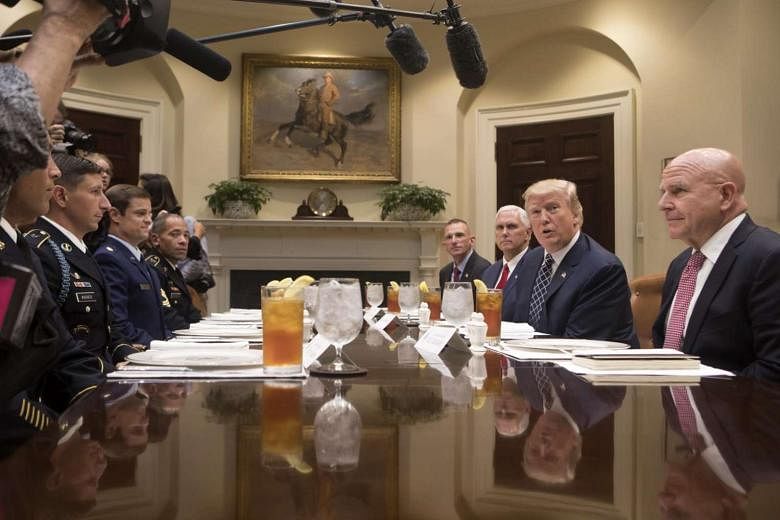NEW YORK (NYTIMES, WASHINGTON POST, REUTERS, AFP) - The seven-year Republican quest to undo Obamacare or the Affordable Care Act appeared to reach a dead end on Tuesday (July 18) in the Senate, leaving US President Donald Trump vowing to let former president Barack Obama's signature domestic achievement collapse.
Trump predicted that Republicans would wait for the federal insurance market to collapse and then work to broker a deal to rewrite the nation's landmark health care law, while Senate leaders pressed ahead with a plan to repeal Obamacare with no immediate replacement.
His plan was now to "let Obamacare fail," he declared, saying Democrats would then seek out Republicans to work together on a bill to bury the Affordable Care Act.
If he is determined to make good on that pledge, he has plenty of levers to pull:
1. Decline to reimburse insurance companies for reducing low-income customers' out-of-pocket costs
The failed effort to replace Obamacare raises new concerns for US health insurers over whether the government would continue to fund billions of dollars in medical benefit subsidies.
The White House has declined to say whether it will continue to pay certain subsidies to plans for very low-income Americans, subsidies seen as vital to the financial health of the exchange business.
The lack of certainty over the so-called cost-sharing reduction payments, which go toward reducing out-of-pocket costs for low-income people, has been a major concern for insurers.
The companies say premiums will be significantly higher without the funding, and some companies that have submitted rates to sell insurance in the market next year could decide to pull out.
While premiums for Obamacare plans rose sharply for many customers this year, a growing body of evidence suggests that the insurers still in the market have begun making money and would be likely to stay if not for the administrative uncertainty.
So far, there has not been a widespread run for the exits among insurers, but that could change if the companies feel that the administration wishes to actively undermine the markets - a course of action that Trump, for the moment, appears to be leaning toward.
2. Fail to enforce the mandate that most Americans have health coverage
The White House has suggested that it might decline to enforce the law's individual mandate.
Obamacare has boosted the number of Americans with health insurance through mandates on individuals and employers, and income-based subsidies.
About 20 million Americans gained insurance coverage through the law.
Both actions - declining to reimburse insurance companies for reducing low-income customers' out-of-pocket costs and failing to enforce the mandate that most Americans have health coverage - will tend to raise prices, discourage insurer participation and make Obamacare shakier than it would be otherwise.
3. Cancel advertising and other efforts to encourage enrollment when annual sign-up period begins in November
A barrage of negative statements from the administration could project an official view that the health law is collapsing, creating a self-fulfilling prophecy.
"With open enrollment for 2018 only three months away, our members and all Americans need the certainty and security of knowing coverage will be available and affordable for them," said Justine Handelman, a senior executive at the Blue Cross Blue Shield Association.
4. Reassure insurers
There is, of course, another possible path. The Trump administration could take actions to reassure insurers and help stabilise markets. It could promise to fund the special subsidies, at least until the end of this year. It could signal that it will instruct the IRS to continue enforcing tax penalties for Americans who lack health insurance. It could promise to advertise Obamacare's fall sign-up period, increasing the number of Americans who learn about the programme and get coverage. It could reach out to carriers and insurance commissioners to help them find ways to remain in bare markets. It has the power to minimise damage from any of the current health law's flaws. At the moment, that does not appear to be the chosen path.
What's Next
With several efforts to repeal and replace Obamacare now squashed, the Senate's top Republican said he would forge ahead with what could be a last-gasp vote - on a new plan to kill off most of the 2010 reforms of Trump's predecessor with no replacement at the ready.
A vote to proceed to the bill will be held "early next week," Senate Majority Leader Mitch McConnell told colleagues, even though the effort appeared doomed, with three Republicans declaring their opposition to the plan.
McConnell nonetheless prepared to force a vote to see where his members stood on his latest ploy, the repeal-only measure.
The new bid would repeal much of Obamacare outright, but with a two-year delay of implementation, in order to allow Congress time to craft a replacement.
A straight repeal bill passed Congress in 2015. That was during Obama's presidency, and Republicans knew they would pay no political price for their votes, as Obama vetoed the measure.
It is no longer a dress rehearsal, and some Republicans are clearly concerned they would be on the hook for any ensuing disruption to the health care system.
Two years ago, the nonpartisan Congressional Budget Office warned that simply repealing Obamacare would essentially kick 18 million people off health care in the first year compared to current law, a figure that would balloon to 32 million by 2026.
That is far worse than the 22 million that the CBO forecast would lose coverage under the latest repeal-and-replace legislation.

